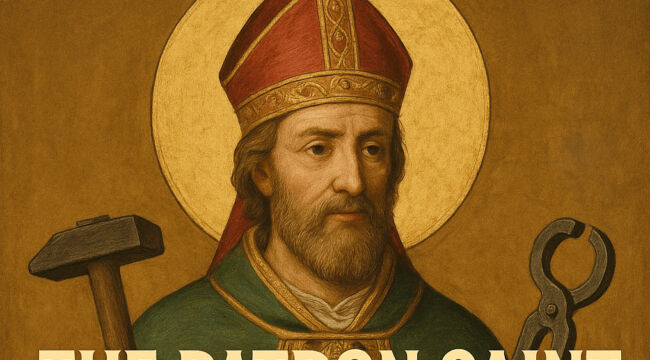The Patron Saint of Sound Money
Long before Powell “paused,” Lagarde fibbed, or Yellen got lost mid-sentence, one man quietly built an economy of trust — with fire, gold, and grit.
His name was Saint Eligius. You probably haven’t heard of him unless you’re a medieval goldsmith or a devout Catholic with a taste for obscure hagiographies. But I’d argue he did more for monetary integrity than any central banker alive today.
Eligius was born in 588 AD near Limoges, in what’s now France. By his twenties, he was already known as one of the finest goldsmiths in Europe. But what made him special — what made him dangerous to the corrupt — is that he was both skilled and honest.
King Clotaire II hired Eligius to craft an ornate gold throne. Eligius used less gold than allotted and returned the surplus.
Imagine that. Today, that gets you audited.
Instead, Clotaire made him Master of the Mint. Eligius didn’t just make money; he made sound money. Coins of pure gold and silver, weighed and struck with precision. Monetary policy, circa 7th century: “Don’t screw it up.”
When Money Meant Something
Sound money isn’t just about shiny metal. It’s about accountability. About permanence. About value derived from scarcity and effort, not from decrees printed on fiat paper or digits added in a central bank’s ledger.
Under Eligius, the French mint produced coins with consistent weight, purity, and integrity.
These coins were trust itself.
When a peasant or noble exchanged a coin struck in Eligius’ mint, they were participating in a system underpinned by honesty.
Contrast that with today’s monetary regime:
- The U.S. dollar has lost over 96% of its purchasing power since 1913, when Wilson created the Federal Reserve.
- Central bankers create fiat money with a keystroke, but real money — hard money — requires extraction, energy, and labor.
- Modern inflation is a form of silent theft. The central banker debases in the name of growth. The worker just pays more at the grocery store.
Saint Eligius ran a monetary system where the value was earned, stored, and respected. That’s a lot closer to Bitcoin than to anything being pushed at Jackson Hole.
The Ethics of the Mint
There’s an old libertarian maxim: “Inflation is theft.”
Eligius would agree. He didn’t inflate. He didn’t cheat. He didn’t dilute.
In a world where kings often debased their coinage to fund wars, Eligius’ honesty was radical. Debasement—mixing base metals, such as copper or tin, into gold or silver coins—was the ancient equivalent of quantitative easing. It allowed rulers to spend more than they earned by stealing value from their people.
Eligius refused. He ran a mint based on purity, not expediency. The coins he oversaw were respected not because of the royal stamp, but because they were what they claimed to be. In a time without electronic ledgers, blockchain verifications, or financial disclosures, reputation was everything.
And Eligius delivered.
The Original Gold Standard
Eligius didn’t invent the gold standard, but he practiced it.
The metal itself backed the coins he struck. There was no promise of value — the value was the coin. This is a key difference between hard money and fiat:
- A silver denarius is
- A dollar bill represents value, but has none intrinsically.
That’s why gold and silver were money for millennia. They didn’t need to trust a central bank. They required trust in the metal. And under Eligius, you got both.
He was also a craftsman, which matters more than you might think. His coins weren’t crude disks; they were well-made, precisely weighed, and beautifully stamped. Craftsmanship in coinage was a signal of integrity.
In modern terms, think of it as the difference between a counterfeit Rolex and a real one. You know the fake is hollow. Eligius never passed off tin for treasure.
Saint of Honest Work
Later in life, Eligius left court life and became the Bishop of Noyon. However, he never abandoned the values of his workshop. He evangelized. He ransomed slaves. He built churches. And he preached the dignity of honest labor and fair exchange.
Today, fake metrics and phantom wealth surround us. Stocks rise on buybacks. Currencies inflate without limit. Wages stagnate while asset prices soar. It’s a shell game.
Saint Eligius reminds us that real value comes from work, integrity, and scarcity. That monetary systems need ethics as much as they need accounting. That you can’t build a civilization on sand, but you can forge one from silver.
Eligius vs. The Fiat Empire
What would Eligius say about today’s monetary elites?
- To Powell: “Your balance sheet is a lie.”
- To Lagarde: “Trust must be earned, not printed.”
- To the IMF: “You enslave with digits what I refused to with chains.”
We talk about “hard money” today as though it were theoretical. But Eligius lived it. He minted it. He was it.
He reminds us that the tools of finance — coin, debt, credit — are only as good as the people who wield them. That’s why his legend endures, even when the value of a dollar doesn’t.
Make Sound Money Sacred Again
Saint Eligius didn’t set interest rates. He didn’t publish dot plots. He didn’t give TED Talks on “transitory disinflationary dynamics.”
He just made honest money and expected others to do the same.
The Church named him a saint. The mint should’ve named him a model.
In a world where money is nothing but credit, and credit is nothing but hope, Eligius offers something more substantial: proof.
He didn’t need blockchain. He was the chain of integrity, value, and principle.
Wrap Up
If you’re tired of being lied to by technocrats, defrauded by inflation, and robbed by dilution, maybe it’s time to get medieval.
Saint Eligius wouldn’t have understood derivatives or derivatives of derivatives. But he understood this:
Money should be honest.
Wealth should be real.
And trust should be earned, not printed.
In that sense, Saint Eligius isn’t just a relic of the past.
He’s a blueprint for the future.



Comments: